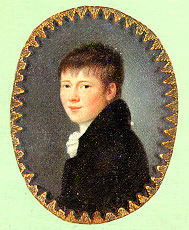

The fallibility of human judgment was a constant preoccupation of Heinrich von Kleist, the Romantic-era German playwright whose works resonate with many of the themes that crop up repeatedly in episodes of The Fugitive — what Kleist might have called Der Gejagte or, more technically, Der Gefahndete. (In fact, the series apparently ran in Germany under the name of Auf der Flucht.)
Trained as a lawyer, Kleist aspired to be a sort of Shakespeare of circumstantial evidence. His novellas and plays often depict characters who, like Richard Kimble, are condemned by society on the basis of deceptively convincing, but false, signs of guilt, when inwardly they are in fact innocent and pure. Kleist's convoluted syntax — practically every sentence describes a long sequence of improbable coincidences leading up to some crucial, often ironical plot twist — makes his narratives sound like court transcripts that have been written by the moving finger of Fate.
In the world of Kleist's imaginings, things are seldom what they seem. Outwardly wholesome, upstanding citizens can secretly harbor primordially evil tendencies, while at the same time, honorable, otherwise pure heroes can commit heinous sins due to accidents of circumstance. Many of the casting decisions made in The Fugitive recapitulate this moral ambiguity, as the same guest stars (Ed Begley, Pat Hingle, etc.) are repeatedly chosen to play both good and bad guys in different episodes.
Kleist was fascinated by how the guilty can look innocent or the innocent guilty. His Der Findling, for example, tells the story of an ungrateful orphan who turns on the kindly family that adopted him, all the while acting like an innocent victim of blind justice, rather in the style of the psycho Bellows from COME WATCH ME DIE. Die Marquise von O, by contrast, depicts the sufferings of a truly innocent heroine who is falsely convicted (in the eyes of her family and the society she lives in) of having engaged in an immoral sex act on the basis of deceiving circumstantial evidence.
In Der Zweikampf, a powerful feudal lord commits murder and then manages to falsely incriminate a virtuous virgin. As a result of his accusations, she is cast out by her narrow-minded father and brothers, who are easily convinced by the cunning false evidence that the lord has planted. Luckily, though, the woman finds a sympathetic knight who accepts her on faith and champions her cause. The case is settled not in a court of law, but in a medieval ritual of single combat to the death, a Zweikampf, between the lord and the knight. Further complications arise when the outcome of the combat is cast in doubt. Both the lord and the knight are injured in the battle, but neither dies immediately. Since the knight's injury appears at first glance to be the more serious, people initially assume that the lord is innocent and the woman guilty. When it turns out later though that the apparently trivial wound suffered by the lord does not heal up and is in fact quite fatal, the falsely accused woman and her defender are exonerated.
The most gripping point in Der Zweikampf comes right after the battle is fought, when the knight seems about to die and the woman seems to be doomed. She actually begins to doubt her own innocence, since the outcome of the battle seems like a divine revelation of her guilt outweighing the evidence of her own senses that tell her she didn't commit the crime. But the knight, even though he has no direct evidence, reassures her and asserts that he still believes her story — not unlike Betty Garrett when Kimble starts to doubt himself due to his amnesia in the episode ESCAPE INTO BLACK, probably the most quintessentially Kleistian episode of them all.
Kleist argues for importance of going on instinct when judging a person, frequently seen to be the right course of action in The Fugitive. Kleist also believed in the supremacy of Gefühl, gut feeling, over Vernunft, logical inference and cold calculation. Gerard identifies himself with this latter force constantly, most obviously in THE 2130, the episode where he joins forces with the programmer of a mainframe computer to track Kimble. To be sure, in that episode Gerard is foiled again, though not especially by the forces of emotional intuition that Kleist revered. But this Kleistian motif is more than aptly illustrated in many other episodes of the series.
Kleist's Michael Kohlhaas tells the story of a man on the run, at odds with a society out to deny him justice. Though Kohlhaas is not accused of a crime, he is nevertheless the victim of a faulty system of justice when he is bilked by a corrupt local official and the higher courts refuse his appeals. Kohlhaas, despite the formidable contingent of authority figures arrayed against him in his quest, perseveres with the same quasi-divine self-assurance frequently exhibited by Richard Kimble in his search for the one-armed man. Like Kimble, Kohlhaas is eventually hunted down by the authorities, who consider him a menace because of his insistence on establishing the truth. The Kohlhaas story also anticipates the idea (brought to fruition in modern times in The Fugitive) of having big stars make guest appearances in the story; it features a cameo by Kohlhaas's celebrity German contemporary, Martin Luther.
In Kohlhaas as well as Der Zerbrochene Krug — in which a corrupt judge presides over the trial of an innocent man who has become the scapegoat for a crime the judge himself committed — Kleist depicts the moral decay inherent in the justice system. He also always has a keen eye for the ugly, morally inferior pillars of society, such as the sanctimonious mobs who are quick to persecute the unjustly condemned criminals in Kleist's novella Das Erdbeben in Chile, while completely overlooking their own shortcomings. Luckily enough, the main characters in Erdbeben, who have been sentenced to death merely because they married against their parents' wishes, are temporarily reprieved by fate when an earthquake frees them just before their hour of doom. (Kleist apparently toyed with the idea of using a train wreck to free them instead, but abandoned it because trains had not yet been invented.)
Kleist despaired of ever achieving fame and recognition and killed himself in 1811. If only he had been able to wait another 152 years, though, his moment would have come. With the advent of The Fugitive, he surely could have been the most popular TV writer of the 1960s.
 Back to HOMEPAGE OF THE HUNTED <http://unchance.net/Fugitive>
Back to HOMEPAGE OF THE HUNTED <http://unchance.net/Fugitive>